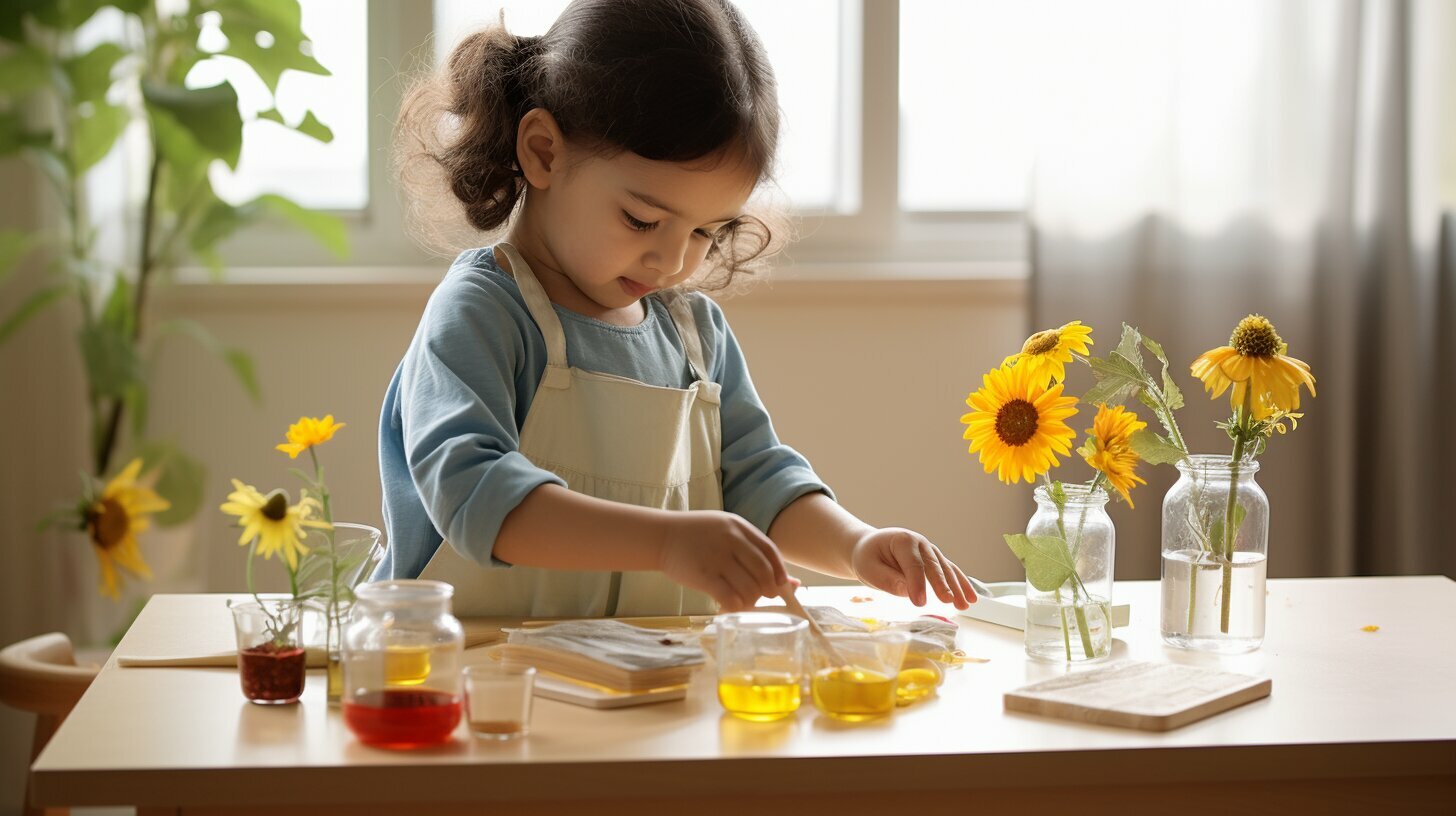The Benefits of Montessori Parenting
By incorporating Montessori principles into parenting, you can provide numerous benefits for your child’s development.
From engaging in Montessori activities to creating a Montessori-inspired home environment, these approaches can support your child’s independence and curiosity.
What is Montessori parenting is a question I have been asked a few times in the last year.
Montessori parenting is a style that emphasizes nurturing and freedom for children while also maintaining healthy limits and boundaries.
It aligns closely with authoritative parenting, where parents set clear expectations and boundaries while respecting their child’s needs and individuality.
It is not permissive or therapeutic parenting, but rather a balanced approach that fosters self-motivation, respect, and play-based learning.
One of the key benefits of Montessori parenting is the focus on age-appropriate activities. Montessori activities are designed to match a child’s developmental stage and promote hands-on learning.
By providing materials and experiences that align with your child’s abilities and interests, you can enhance their cognitive, physical, and emotional growth.
Montessori materials, such as puzzles, sensorial toys, and practical life activities, allow children to explore and learn at their own pace, fostering a love for learning and a sense of accomplishment.
Montessori parenting encourages respect for the child, allowing freedom and choice within limits, and nurturing self-motivation.

In addition to engaging in Montessori activities, creating a Montessori-inspired home environment can greatly benefit your child’s development.
This includes setting up a prepared environment that is child-friendly and promotes independence. Montessori at home involves organizing spaces where your child has easy access to toys, books, and materials that they can choose and use independently.
It also emphasizes the importance of involving children in daily tasks and fostering their practical life skills, such as dressing, cooking, and cleaning.
By creating an environment that supports self-sufficiency, you are empowering your child to take ownership of their learning and daily routines.
As you embrace Montessori parenting, remember that it is a holistic approach that extends beyond activities and environment.
It is about creating a positive relationship with your child, based on mutual respect and understanding.
By following the child’s lead, observing sensitive periods of development, using effective discipline methods, and modelling the right behaviours, you can provide a nurturing and supportive environment for your child’s growth.
Remember to adapt the Montessori approach to your child’s individual needs and preferences, and involve other family members in the parenting approach.
Montessori parenting is based on common sense and does not require expensive toys or materials; it is guided by principles of respect, observation, self-motivation, and play-based learning.
Benefits of Montessori Parenting at a Glance:
| Benefits | Montessori Activities | Montessori Home Environment |
|---|---|---|
| Enhanced cognitive, physical, and emotional development | Engaging in age-appropriate activities | Creating a child-friendly and independent environment |
| Fosters self-motivation and love for learning | Using Montessori materials and hands-on experiences | Involving children in practical life tasks |
| Promotes independence and self-sufficiency | Allowing freedom and choice within limits | Organizing a prepared environment at home |
How to Implement Montessori Parenting Techniques
Implementing Montessori parenting techniques requires a thoughtful and intentional approach.
By following the child’s lead, observing their sensitive periods of development, and incorporating effective discipline methods, you can create a nurturing and supportive environment for your child.
In the Montessori method, the parent acts as a guide, supporting the child’s natural curiosity and desire for independence.
One key principle is to follow the child’s lead, allowing them to take the lead in their learning and exploration. Observe your child for signs of readiness and interest in certain activities or skills, and provide appropriate materials and opportunities to foster their development.
Effective discipline methods in Montessori parenting focus on teaching rather than punishing. Instead of using rewards or punishments, encourage your child to make choices and learn from the natural consequences of their actions.
Model respectful behaviour and use gentle redirection or natural consequences to guide their behaviour, always taking into account their individual needs and temperament.
It’s essential to create a child-friendly environment that promotes independence and self-motivation.
Arrange your home in a way that allows your child to access their materials and toys independently. Use child-sized furniture and low shelves to encourage their autonomy. Provide open-ended toys and activities that promote exploration and problem-solving.
| Montessori Principles and Practices | Montessori Parenting Approach |
|---|---|
| Respect for the child | Allowing freedom and choice within limits |
| Observation of the child’s needs and interests | Adapting to the child’s individual needs and preferences |
| Self-motivation and intrinsic learning | Nurturing self-motivation and a love for learning |
| Play-based learning | Promoting hands-on, experiential learning |
Incorporating Montessori principles into your parenting approach can foster your child’s independence, self-confidence, and love for learning. By implementing these techniques, you can create a nurturing environment where your child can thrive.
The Montessori Approach to Creating a Child-Friendly Environment
Creating a Montessori-inspired environment at home is essential for fostering independence and self-motivation in your child.
By understanding the benefits and following practical tips, you can create a nurturing and engaging space for your little one. Montessori parenting is based on the philosophy that children are naturally curious and have an innate desire to learn.
By providing a child-friendly environment, you can support their natural development and encourage them to explore the world around them.
One of the key aspects of a Montessori environment is accessibility. This means organizing your child’s belongings at their level, making it easy for them to access and return items independently.
Consider using open shelves or low baskets to store toys, books, and materials. This not only promotes independence but also helps develop their sense of order and responsibility.
In addition to accessibility, incorporating age-appropriate Montessori activities is crucial for your child’s development.
These activities focus on building practical life skills, sensory exploration, and fostering creativity.
Examples of Montessori activities for children include pouring water from one container to another, sorting objects by colour or shape, and engaging in hands-on art projects.
These activities not only stimulate their cognitive and physical development but also encourage concentration and problem-solving skills.
| Benefits of Creating a Montessori-Inspired Environment |
|---|
| Promotes independence and self-motivation |
| Develops practical life skills and sensory exploration |
| Encourages concentration and problem-solving skills |
| Fosters a sense of order and responsibility |
| Supports natural curiosity and love for learning |
Creating a Montessori-inspired environment goes beyond physical surroundings. It also involves adopting a Montessori philosophy for parenting.
This means providing your child with freedom and choice within limits, respecting their individual needs and preferences, and involving other family members in the parenting approach.
By embracing Montessori principles, you can create a harmonious and supportive environment that nurtures your child’s growth and development.

Montessori parenting offers numerous benefits for children, parents, and the family as a whole.
By embracing the Montessori approach, parents can create a positive and enriching environment that fosters their child’s overall development. Some key benefits of Montessori parenting include:
- Promotes independence and self-motivation
- Encourages problem-solving and critical thinking
- Fosters a love for learning and a growth mindset
- Cultivates respect for oneself and others
- Builds essential life skills and practical knowledge
“The goal of early childhood education is to cultivate the child’s own natural desire to learn.” – Maria Montessori
By implementing Montessori principles and creating a child-friendly environment, you can provide your child with the foundation they need to thrive and succeed. So, why not embrace Montessori parenting and witness the transformation it brings to your child’s life?
Embracing Montessori Parenting: A Balanced Approach to Child Development
Embracing Montessori parenting allows you to provide a balanced approach to your child’s development, promoting child-centred learning, hands-on experiences, and fostering independence and self-directed learning.
By incorporating sensory development and practical life skills, you can nurture your child’s holistic growth.
Montessori parenting is a style that emphasizes nurturing and freedom for children while also maintaining healthy limits and boundaries.
It aligns closely with authoritative parenting, offering a blend of warmth and structure. It encourages respect for the child, allowing freedom and choice within limits, and nurturing self-motivation.
One of the key principles of Montessori parenting is following the child’s lead. By observing their interests and passions, you can tailor activities and experiences that engage and inspire them.
This child-centred learning approach not only fosters a love of learning but also helps to develop their unique talents and strengths.
In addition to child-centred learning, Montessori parenting promotes hands-on experiences.
Providing age-appropriate activities and materials allows children to explore their environment, engage their senses, and develop essential practical life skills.
Through these hands-on experiences, they learn problem-solving, critical thinking, and creativity, all while building confidence and independence.
Sensory development is another important aspect of Montessori parenting. By offering a variety of sensory experiences, such as texture exploration, sensory play, and nature walks, you can stimulate your child’s senses and support their cognitive, emotional, and physical development.
This holistic approach recognizes the interconnectedness of sensory experiences and overall growth.
Lastly, Montessori parenting encourages the cultivation of independence and self-directed learning.
By giving children space to take age-appropriate risks, make choices, and solve problems on their own, you empower them to become self-motivated learners. This not only instils a sense of autonomy and confidence but also fosters a lifelong love of learning.
Embracing Montessori parenting provides a comprehensive approach to child development. From child-centred learning and hands-on experiences to promoting independence and self-directed learning, this parenting style nurtures the whole child.
By incorporating sensory development and practical life skills, you can provide your child with a solid foundation for lifelong success and happiness.
The Benefits of Mothers and Fathers’ Life Insurance in a Montessori Parenting Environment
A secure and nurturing environment is essential for a child’s independence, self-motivation, and emotional well-being in a Montessori parenting approach.
Both mothers life insurance cover and fathers life insurance plans can play a significant role in supporting this environment by providing a financial safety net that protects a child’s future, even in the face of unexpected events.
Life insurance tailored for families offers reassurance that funds will be available to cover essential needs, such as education, daily living expenses, and personal development opportunities.
With this financial safeguard, parents can fully embrace Montessori principles, focusing on cultivating a child’s curiosity and growth, knowing that they have secured a stable foundation for their family’s future.
This preparation allows both parents to nurture a supportive environment that aligns with their child-centred values, knowing they are providing for their child in every possible way.
FAQ
Q: What is Montessori parenting?
Montessori parenting is a style that emphasizes nurturing and freedom for children while also maintaining healthy limits and boundaries.
It aligns closely with authoritative parenting and encourages respect for the child, allowing freedom and choice within limits, and nurturing self-motivation.
Q: How can I incorporate Montessori principles into my parenting?
You can incorporate Montessori principles into your parenting by following the child’s lead, observing for sensitive periods of development, using effective discipline methods, giving children space to take age-appropriate risks, and modelling the right behaviours.
It is important to create a child-friendly environment that promotes independence, involves other family members in the parenting approach, and adapts to the child’s individual needs and preferences.
Q: Does Montessori parenting require expensive toys?
No, Montessori parenting is based on common sense and does not require expensive toys. It is guided by principles of respect, observation, self-motivation, and play-based learning.

